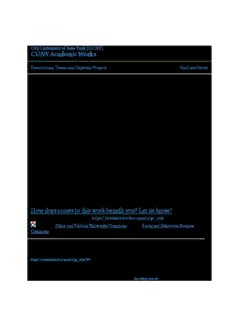Table Of ContentCCiittyy UUnniivveerrssiittyy ooff NNeeww YYoorrkk ((CCUUNNYY))
CCUUNNYY AAccaaddeemmiicc WWoorrkkss
Dissertations, Theses, and Capstone Projects CUNY Graduate Center
2-2015
AAnn AAsssseessssmmeenntt OOff TThhee TThheerraappeeuuttiicc FFiibb:: TThhee EEtthhiiccaall AAnndd
EEmmoottiioonnaall RRoollee OOff TThheerraappeeuuttiicc LLyyiinngg IInn TThhee CCaarreeggiivviinngg OOff
AAllzzhheeiimmeerr''ss DDiisseeaassee PPaattiieennttss BByy NNoonn--MMeeddiiccaall CCaarreeggiivveerrss
Dina Green
Graduate Center, City University of New York
How does access to this work benefit you? Let us know!
More information about this work at: https://academicworks.cuny.edu/gc_etds/567
Discover additional works at: https://academicworks.cuny.edu
This work is made publicly available by the City University of New York (CUNY).
Contact: [email protected]
AN ASSESSMENT OF THE THERAPEUTIC FIB:
THE ETHICAL AND EMOTIONAL ROLE OF THERAPEUTIC LYING IN THE
CAREGIVING OF ALZHEIMER’S DISEASE PATIENTS BY NON-MEDICAL
CAREGIVERS
by
DINA J. GREEN
A master’s thesis submitted to the Graduate Faculty in Liberal Studies in partial fulfillment of
the requirements for the degree of Master of Arts, The City University of New York
2015
2015
DINA J. GREEN
Some rights reserved.
This work is licensed under a Creative Commons
Attribution 4.0 United States License.
http://creativecommons.org/licenses/by/4.0/
ii
This manuscript has been read and accepted for the
Graduate Faculty in Liberal Studies in satisfaction of the
dissertation requirement for the degree of Master of Arts.
____________________ _________________________
Date Dr. Rosamond Rhodes
Thesis Advisor
____________________ __________________________
Date Dr. Matt Gold
Executive Officer
THE CITY UNIVERSITY OF NEW YORK
iii
Abstract
AN ASSESSMENT OF THE THERAPEUTIC FIB:
THE ETHICAL AND EMOTIONAL ROLE OF THERAPEUTIC LYING IN THE
CAREGIVING OF ALZHEIMER’S DISEASE PATIENTS BY NON-MEDICAL
CAREGIVERS
by
Dina J. Green
Advisor: Dr. Rosamond Rhodes
This study qualitatively assesses the various aspects of the use of the therapeutic lie in care
giving for Alzheimer's Disease patients while examining the ethics of lying associated in and out
of the medical setting. The objectives of this study are to: gain an understanding of the role
therapeutic lying plays in the care given by non-medical caregivers through a series of focus
groups and interviews; examine the moral and emotional issues related to the use of this practice
with a focus on non-medical caregivers; gather knowledge of the use of therapeutic lying in
order to improve care for Alzheimer's Disease patients. The therapeutic lie is believed to a) be
mutually beneficial for both the caregiver and the Alzheimer's patient by easing communication
between the two parties; b) cause a feeling of moral ambiguity for the caregiver due to the
socially entrenched view that lying is unethical; c) present ethical dilemmas for the caregivers.
iv
Acknowledgements
Foremost, I would like to express my sincere gratitude to my advisor, Dr. Rosamond
Rhodes for her support of my research, for her patience, enthusiasm and knowledge. Her
guidance helped me throughout the time of research and writing of this thesis. My sincere thanks
also goes to Katherine Koutsis and Dr. Matt Gold for their support throughout my graduate
education, through the thesis research and writing process. I also thank Kay Powell, and Antonia
Santangelo for their help and persistence during the progression of my research.
In particular, I am grateful to Matt Kiddush and Wendy Panken of the Alzheimer’s
Association New York Chapter and Lauren Hertan for acting as incomparable resources over the
duration of this project and without whom, this research would not be possible. Last but not the
least, I would like to thank my family: my parents Arthur and Jill Green and aunt and uncle,
Amy and Scott Kellman for their tremendous support and insights.
v
Table of Contents
Chapter 1..........................................................................................................................................1
Introduction..............................................................................................................................2
Ethics of Lying.........................................................................................................................5
Chapter 2........................................................................................................................................17
Background............................................................................................................................17
Methods.................................................................................................................................21
Results....................................................................................................................................24
Discussion..............................................................................................................................35
Conclusion.............................................................................................................................40
Appendix........................................................................................................................................41
Appendix A- Demographic Survey Form..............................................................................41
Appendix B- Focus Group Discussion Form.........................................................................44
Appendix C1: Focus Group 01 Transcript.............................................................................47
Appendix C3: Focus Group 02 Transcript.............................................................................54
Appendix C2: Focus Group 03 Transcript.............................................................................61
Appendix C4: Interview 01 Transcript..................................................................................66
Bibliography..................................................................................................................................73
vi
List of Tables
1. Table 1.1: Stages of Alzheimer’s Disease……………………………………………………2
2. Table 1.2: Likelihood of Hypertension as Varied by Age……………………………………12
vii
List of Illustrations
1. Figure 2.1: Care giving Experience of Participants at Each Stage of Alzheimer’s Disease and
First uses of Therapeutic Fib…………………………………………………………………..…24
2. Figure 2.2: Communication Techniques Used by Caregivers……………………..…………25
viii
Chapter 1
Introduction
In 1906, when Dr. Alois Alzheimer first described a “peculiar” disease marked by
profound memory loss, he certainly would have had no idea of the invasively challenging role it
would play in the family dynamic. Today, that mentally degenerative disorder affects
approximately 5.4 million people.1 It causes those affected to experience declines in memory,
speech, and motor skills as well alterations in personality and drastic mood shifts, among other
behavioral symptoms. It is not uncommon for patients to experience episodes of hallucinations,
paranoia and delusions, often times reverting back to former periods in his or her life. The
paranoia and confusion may present in forms ranging from asking when a deceased spouse will
return home from the store to thinking that his own home is a hotel. Confusion and memory loss,
such as difficulty recognizing once familiar objects and people, add to these beliefs. More severe
episodes may include outbursts of rage or the patient believing he is being incarcerated.
Frequently, the patient is in his own world and his world is ever in flux.
Alzheimer’s Disease progresses through a course of seven stages of changing mental and
physical ability (Table 1.1). With each stage comes a unique series of challenges for both the
patient and those close to the patient. From detection, usually around Stages 2 or 3, through
Stage 6, the mental metamorphosis raises a tangible communication barrier in how family
1
Alzheimer’s Association. 2011 Alzheimer’s Disease Fact and Figures. Chicago, IL:
Alzheimer’s Association, 2011.
1
Description:Capstone Projects by an authorized administrator of CUNY Academic Works. For more .. truthful and observe full disclosure and respect in practice.12 The confidentiality between doctor and patient ensures . the therapeutic lie, promotes a positive approach in care giving, which means a methodology.

